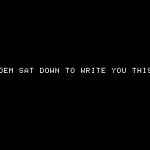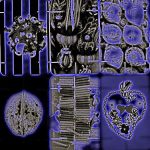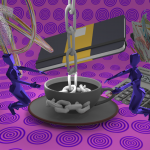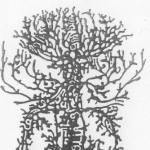electropoetics
“the many gods of Mile End”: CanLit Print-Culture Nostalgia and J.R. Carpenter’s Entre Ville

Carl Watts argues that J.R. Carpenter’s Entre Ville constructs Canadian literature as a unified, holistically understood entity that is both broadly accessible and fleetingly familiar. In so doing, Carpenter’s work aligns representations of Montréal with uses of new media, with the cross-cutting and mutually exclusive identities of the former mirrored in new-media poetry’s partial or conditional embrace of the formal possibilities of digital poetry.
Introduction: Decoding Canadian Digital Poetics

Dani Spinosa and Lai-Tze Fan discuss the need for a Canadian digital poetics, as well as for an understanding of its past developments, present shifts, and future possibilities.
“A Snap of the Universe”: Digital Storytelling, in Conversation with Caitlin Fisher

In this conversation with ebr Editor Lai-Tze Fan, internationally acclaimed artist Caitlin Fisher talks through her origins, inspirations, and processes with a clear message: things can always be unlocked with more than one key and stories can always be told with more than one method. Fan asks Fisher about the 20th anniversary of These Waves of Girls at the end of Flash, the archival impulse of her stories from doll collections to hand-held museums, and the importance of creating tiny stories out of high technologies and giant institutional labs. Of the many lives Fisher has already lived and of her works to come, this conversation gives only a glimpse—a snap of the universe.
“language isn’t revolutionary enough”: In/Human Resources and Rachel Zolf’s Gematria

MLA Chernoff closely examines Rachel Zolf's intentionally unreadable suite of transmedial poetry, Human Resources (2007), in order to discern a digital poetics of appropriation that carefully grapples with the problematics of historically exclusionary institutions like conceptual poetry and CanLit. They argue that behind the constraint-based, numerological practices used to create these strange poems lies a pragmatic – yet metaphysically-grounded – method of reframing the professionalization of creative writing and upending the neoliberal conventions of governmental grants.
Digital Ganglia and Darren Wershler’s “Nicholphilia”

This essay engages with the complex translation of materiality that occurs between Darren Wershler’s NICHOLODEON (1997) and its eventual digital incarnation as NICHOLODEONLINE (1998). Both of these works pay homage to the influential avant-garde Canadian poet, bpNichol. Beyond situating Wershler’s texts in a historical framework that moves from Nichol to the 'Pataphysics of Alfred Jarry, Sean Braune looks at select metadata “clues” that Wershler left behind for the curious-minded reader (human and machine), as well as placing Wershler’s work (and Nichol’s by extension) in the context of theories of language that move from the human to the “tower of programming languages” that are described by Rita Raley and Friedrich Kittler.